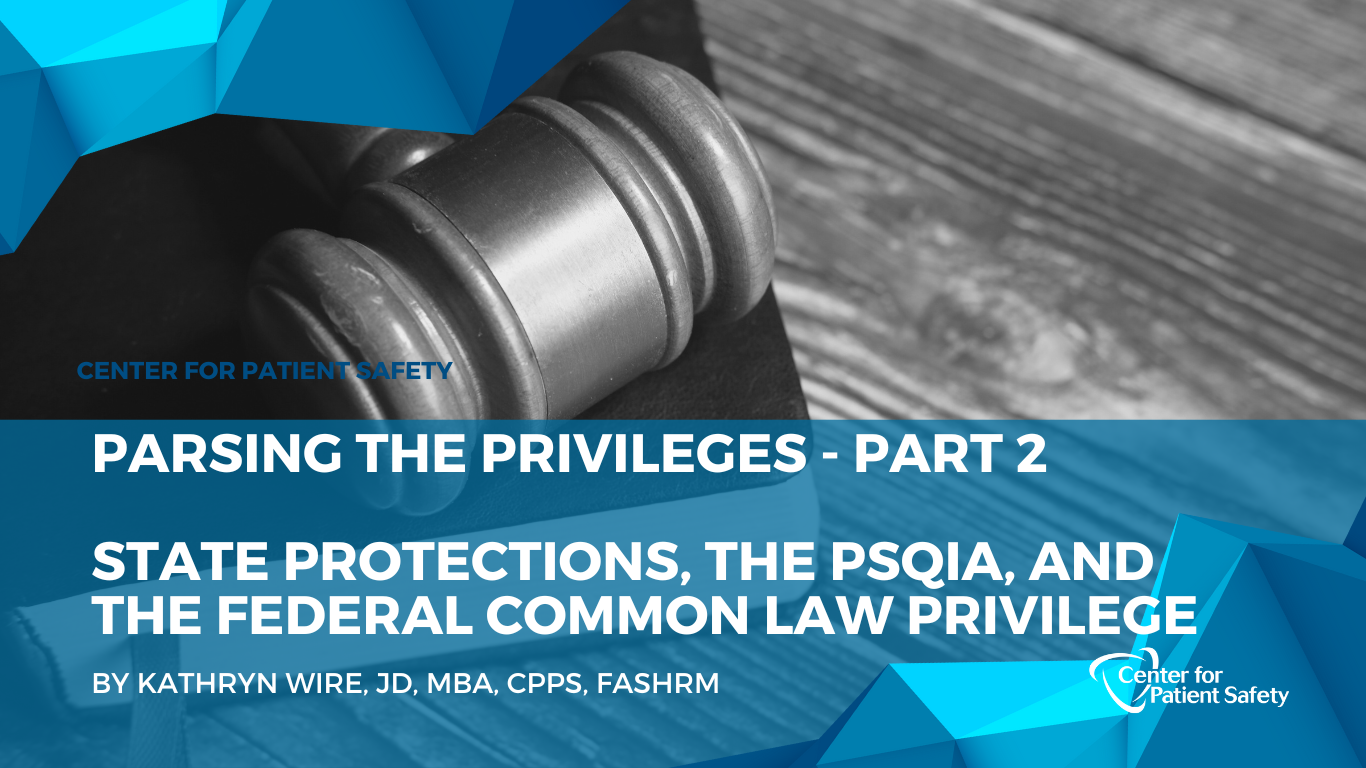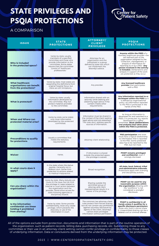Parsing the Privileges - Part 2 State Protections, the PSQIA, and the Federal Common Law Privilege

Congress passed the Patient Safety and Quality Improvement Act (PSQIA) in part to provide relief from the wide variation in federal and state law protecting safety and quality work. Many of the state statutes still refer to “peer review,” a problem addressed below. Others only protect work that takes place in a committee of licensed providers. Some only protect the information produced by the committee, not information provided to it. Any assessment of state protections must address a few basic questions:
- What is protected?
- Who is protected? (Participants)
- What organizations can benefit from the privilege? (Example: not all states include EMS)
- Can the protections be waived?
- Can the protected entity share the information if needed? If so, will the privilege be waived?
- In which courts or tribunals do the protections apply?
- Does the state have mandatory event reporting and what special confidentiality applies to reported events?
I have spent most of my legal career in Missouri, so I am most familiar with R.S.Mo §537.035 (2020), our state’s statute.[1] I will use it as an example in our discussion below, but always check your own laws, as they are all different. State codification systems also differ, so I can’t tell you where to look for yours. Fortunately, the Horty Springer healthcare law firm gives us a headstart with a website that lists peer review protections by state: Peer Review Statutes by State (hortyspringer.com). An attorney can help, but if you rely on an attorney who does not specialize in privilege-related work, don’t hesitate to confirm their advice about the protections in your state. This is a highly specialized area, and the state laws are often detailed and confusing. The Center has worked with several clients that had received inaccurate legal advice.
“Peer Review” Is In Their DNA
Most of the state provisions arose from the desire to encourage “peer review” and to insulate from liability the individuals who provided evidence in peer review proceedings which looked at the care provided by a single individual on the medical staff. They originated about the same time as the Health Care Quality Improvement Act of 1986 (HCQIA)[2], a federal law which addresses liability, confidentiality and the rights of individuals involved in the hospital medical staff peer review process, including the subject of the review. Over time, some states have broadened their statutes to protect a much wider range of activities related to improving the safety and quality of healthcare, but many have not. Even those with a broader scope often speak of “peer review committees.” If a state statute uses that term, it is important to study the definitions to determine if the law applies to peer review in the narrow HCQIA sense or the broader patient safety context. Some statutes have expanded the definition of healthcare provider beyond hospitals and their associated provider groups; others have not.[3]
Federal Court: State Protections Usually Don’t Apply, and Federal Courts Have No Privilege of Their Own
First, a quick lesson in Federal civil procedure. In some cases (those involving diversity jurisdiction), the federal courts decide state questions and will apply state laws, which likely include the application of the state’s peer review privilege. Few cases against healthcare providers qualify for diversity jurisdiction, though, as it requires that no plaintiff is domiciled in the same state as any defendant, as standard that can be easily manipulated by a plaintiff to stay in state court.[4] In 2022, only 326 diversity cases were filed involving medical malpractice.[5]
Most federal court cases arise under “the Constitution, laws, or treaties of the United States,” which gives the court subject matter jurisdiction. Because these cases don’t involve state law, the courts won’t apply state privileges. For example, cases involving U.S. labor and civil rights law are federal question cases. Though they may touch on peer review, safety, and quality, and plaintiffs may request potentially protected information, the state peer review statute cannot be invoked to protect the party holding the material. In fact, a number of PSQIA cases involve federal questions such as civil rights, especially when the provider works in a government space, such as correctional medicine.[6] Medical staff members or employees who claim injury to a federally protected interest often try to access a broad swath of otherwise privileged safety and quality information. In one federal criminal fraud case, the Department of Justice sought information about a hospital’s review of the defendant’s extensive history of allegedly unnecessary care. The court refused to consider any state privilege or the application of any federal common law privilege.[7]
While some federal courts inch toward creating their own common law peer review privilege (see the discussion in Hein and Nagele, cited below) [8], the process is slow and haphazard. Each court deciding the issue is essentially free to reach its own conclusions within wide boundaries.
The bottom line: don’t count on the application of any privilege to protect safety and quality work in any case in federal court based on subject matter jurisdiction without the PSQIA.
Congress’ Solution: The PSQIA
Congress wanted to create a predictable safe space for providers to undertake their patient safety improvement work, removing the fear of exposure arising from the haphazard collection of existing laws. The PSQIA eliminates the concerns with state and federal protections in a number of ways.
- PSQIA protections apply in every tribunal and regulatory arena in the country—state, local, tribal, or federal.
- The PSQIA supersedes any other law that provides less protection.
- The scope of the Patient Safety Evaluation System-the provider’s protected space-is determined within very broad parameters by each provider that participates with a PSO.
- The PSQIA offers several options for collaborative work within a system or with others, all within the protected space.
The Missouri Example
Missouri’s statute falls in the middle between the most and least expansive. Here, I’ll present the pros and cons of relying on it for protection; the material is paraphrased for general discussion and not provided for legal analysis of Missouri protections.
- Definition of Peer Review Committee
- Committee's purpose includes evaluation and monitoring the quality and utilization of healthcare, but doesn’t mention “improvement.”
- Must be appointed by leaders of a hospital, long-term care facility or an entity under the Department of Mental Health, HMO, or a partnership or society of healthcare professionals
- Any other organization formed “pursuant to state or federal law” and authorized to act as a peer review committee
- Scope of Protection
- Deliberations, minutes, and other records generated in or by the committee regarding “the health care provided any patient” are privileged. Courts have focused on this provision to deny protection for work that doesn’t specifically concern the healthcare of any patient. They have also denied protection for reports prepared by others and submitted to the committee, even if the committee requested the report, especially if the author did not personally attend a meeting.[9]
- Professionals for whom it can apply: there is a list of specific professions but no terms to expand the scope beyond the list (e.g. “include but not limited to”). EMS providers have no protection.
- Material is not subject to subpoena for release to any person nor admissible as evidence in any judicial or administrative action for failure to provide appropriate care. Presumably, the statute would not apply in any other kind of case.
- Waiver
- Disclosure of protected information does not waive the protections.
- The statute does not specifically address the organization’s ability to use the protected information internally for other purposes.
- Exceptions
- Protections don’t apply in actions brought by the committee or its founding legal entity related to the privileges of providers or when a member of the committee is sued for actions involving the committee.
- Licensing boards can subpoena information related to investigations within its jurisdiction.
Maximizing the Benefit from Both
The PSQIA protections are at least as broad as those in every state, and almost always provide more extensive privilege and confidentiality for safety and quality work. The PSQIA also gives PSO participants extensive flexibility to include work in the protected space or leave it out. Why not just throw it all into the PSES? PSQIA protections were designed as a broad shield that can’t be breached. There are limited options to share PSWP outside the provider organization. Even if it is shared in violation of the PSQIA protections, the protections remain in place. There is no waiver.
Many of the state laws include pathways to share protected information in ways that can provide benefits to the provider, the individuals involved in the investigations, and the healthcare community. For example, a hospital might want to share the results of an investigation that reveals reckless behavior with the licensing board. An executive committee that ends a physician’s staff privileges needs to defend itself if the physician sues. If a nursing home terminates a nurse for harmful or dangerous behavior, it will want to use the results of at least part of its analysis to defend a resulting claim for violation of employment laws. Most state laws allow a provider to share privileged information in these circumstances; an organization can benefit from those provisions. Providers should work with counsel to identify how to position the right work in the Patient Safety Evaluation System (PSES) and different work in the peer-review state-protected space.
State Law and PSQIA
 A related article (Parsing the Privileges Part 1) looks at the limitations of attorney-client privilege. Download a State Privileges and PSQIA Protections Comparison. The Center for Patient Safety can collaborate with clients and their attorneys in the assessment of these issues and the development of an appropriate PSES. If you have questions, contact us HERE.
A related article (Parsing the Privileges Part 1) looks at the limitations of attorney-client privilege. Download a State Privileges and PSQIA Protections Comparison. The Center for Patient Safety can collaborate with clients and their attorneys in the assessment of these issues and the development of an appropriate PSES. If you have questions, contact us HERE.
Footnotes
1 Missouri Revisor of Statutes - Revised Statutes of Missouri, RSMo Section 537.035
2 42 U.S.C. § 11101 et seq.
3 Some states have a laundry list of provider types. Others refer to, for example, “all providers licensed under Section XXX.” Some combine those two approaches, creating confusion for those who are not on the “list” but are in the prescribed licensing category. For example, Tennessee’s privilege statute defines eligible providers as a “healthcare facility licensed or regulated under this title…” EMS agency and individual provider licensing provisions were not originally in Title 68, but were moved there, which creates confusion about the applicability of the statute to EMS providers. The Tennessee statute has an interesting safe haven, however, and includes as a covered provider any entity that maintains a patient safety evaluation system in compliance with the PSQIA. TN Code § 68-11-272 (2021).
4 28 U.S.C. § 1332(a)
5 Table 4.9, Report of the Director, Judicial Business of the United States Courts. jff_4.9_0930.2022.xlsx (live.com)
6 See, e.g. Christina Nelms v. Wellpath, et al., Case No. 21-10917 (E.D. MI), https://ecf.mied.uscourts.gov/doc1/097113011341
7 Missouri Baptist Medical Center v. U.S. Department of Justice 4:22-mc-00871-RLW, filed 01/19/2023. https://cases.justia.com/federal/district-courts/missouri/moedce/4:2022mc00871/198525/18/0.pdf Unfortunately, the hospital did not assert any PSQIA protection.
8 Elizabeth Hein, Robin Locke Nagele: “PSQIA Prompts Federal Courts to Reconsider a Federal Common Law Peer Review Privilege,” American Health Law Association (Medical Staff, Credentialing and Peer Review) (2017). mscpr_november17__psqia_prompts_federal_courts__nagele_and_hein.pdf (postschell.com)
9 State ex rel Kirksville Missouri Hospital Company llc d/b/a/ Northeast Regional Medical Center v. Jaynes, WD72684 (2010)
.png)